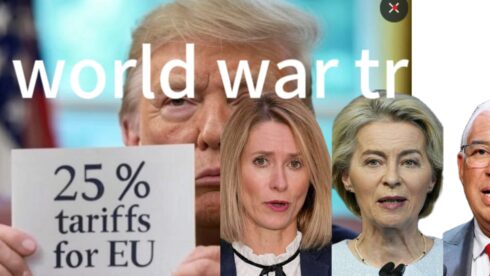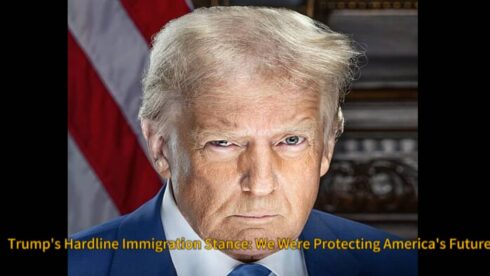President Donald Trump has confirmed that tariffs on European Union (EU) imports into the United States “will definitely happen,” following similar moves targeting Canada, Mexico, and China. The announcement adds to growing fears of a global trade war, with the U.S. aggressively imposing protectionist measures against major trading partners.
While Trump has not ruled out imposing tariffs on the United Kingdom, he suggested that differences could be resolved through negotiations with British Prime Minister Sir Keir Starmer, whom he described as “very nice.” The U.S. president noted that while the UK is “out of line” on trade, he believes the issue “can be worked out.” This statement follows previous remarks where Trump accused the UK and the EU of unfair trade practices, particularly regarding U.S. agricultural and automotive exports.
North American Tariffs Set to Take Effect Amid Retaliation Threats
The latest tariffs include a 25% levy on imports from Canada and Mexico, as well as a 10% tariff on Chinese goods, all set to take effect on Tuesday. Trump has scheduled talks with Canadian Prime Minister Justin Trudeau and Mexican President Claudia Sheinbaum on Monday, signaling potential last-minute negotiations.
In response, both Canada and Mexico have announced retaliatory tariffs, while China has vowed to take “corresponding countermeasures” and is preparing to file a lawsuit with the World Trade Organization (WTO). Canadian border city mayors, including Windsor’s Drew Dilkens, have criticized the move, calling it a “lose-lose proposition” that will harm businesses and consumers on both sides of the border. “One person described this as a circular firing squad… No one is going to win at the end of the day,” Dilkens told the BBC.
Market Reactions: Asian Stocks Plunge, U.S. Dollar Strengthens
Asian markets were the first to react to Trump’s tariff announcements, opening sharply lower on Monday. Hong Kong’s Hang Seng Index fell by 1.5%, Japan’s Nikkei 225 dropped 2%, South Korea’s Kospi tumbled 2.7%, and Australia’s ASX 200 declined by 1.6%. Meanwhile, China’s offshore yuan weakened to a record low against the U.S. dollar, which surged to a 20-year high against the Canadian dollar.
Market analysts predict further volatility as countries implement retaliatory measures. The prospect of escalating trade disputes has unsettled global investors, with uncertainty surrounding how businesses will absorb rising costs and potential supply chain disruptions.
China Holds Fire, Pursues WTO Action Instead of Immediate Retaliation
Unlike Canada and Mexico, China has refrained from announcing immediate counter-tariffs. Instead, Beijing is focusing on legal action through the WTO while urging Washington to engage in negotiations. Chinese officials hope to “meet the U.S. halfway” to avoid a full-blown trade war.
Analysts suggest that China’s cautious approach may be influenced by its economic slowdown and the ongoing Lunar New Year holiday, which could delay a stronger response. However, past trade disputes indicate that Beijing may resort to tariffs or restrictions on U.S. imports if talks fail. Trump’s actions have further strained relations between the two economic giants, raising concerns about long-term impacts on global trade stability.
Trump says U.S. Consumers to Feel the Impact temporarily as Tariffs Drive Up Costs
With Canada and Mexico being the largest oil exporters to the U.S., tariffs on energy imports are expected to drive up fuel prices. Mukesh Sahdev of Rystad Energy warned that if these tariffs remain in place beyond the next quarter, Americans could see significantly higher prices at the pump.
Trump acknowledged that Americans would feel “a little pain” in the short term but justified the tariffs as necessary for correcting trade imbalances. “The United States has been ripped off by virtually every country in the world,” he said, adding that the country has been helping its trade partners for too long without adequate reciprocity. He also warned that Mexico could face “worse tariffs” if it does not address illegal immigration and fentanyl trafficking.
As trade tensions escalate, businesses and consumers alike are bracing for economic disruptions. With global markets on edge and retaliatory actions mounting, Trump‘s aggressive tariff strategy may have far-reaching consequences for the U.S. and the world economy.














